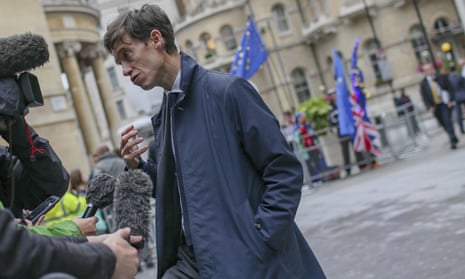After the dodo, the most iconically dead bird in popular culture is the Norwegian blue parrot whose stiffened corpse appeared in the famous Monty Python sketch. Theresa May’s Brexit deal was compared to that parrot many times in the first months of this year in parliament and newspaper commentary. (It was also likened to a dodo on one front page.)
The deal was rejected three times by MPs; bludgeoned by remainers and leavers alike. It was declared expired; an ex-deal. The ostensible purpose of the Tory leadership contest, the criterion on which most of the candidates compete, is the quest for someone who can get a new, better deal – or who has the confidence to pursue Brexit without one. Only Rory Stewart poops the party by suggesting that the efficient route out of the EU is through the door that was opened by negotiation (and not by leaping from a top-storey window).
Stewart’s candour has disturbed the equilibrium of the race in unforeseen ways, but it would still be extraordinary if he ended up as prime minister. His service to the Tory party might instead turn out to be that of the doctor– or vet? – who stays with the apparently deceased deal just a bit longer than everyone else and, when the room has nearly emptied, finds the faintest pulse and calls everyone back.
Because Stewart is obviously right on one thing: any Brexit plan involving a deal involves the deal. It might, in extremis, have codicils and clarifying notes attached. In the most generous scenario, the EU might agree to some mechanism that could, if held up to the light at a certain angle and interpreted creatively by a compliant attorney general, look like some kind of enhanced British control over implementation of the Northern Irish backstop. It will still be the deal.
And even in the “no-deal” scenario, the UK would immediately seek accommodation with the EU to sustain essential economic and legal functions of the relationship. The conditions laid down by Brussels have already been declared: settlement of financial obligations; citizens’ rights; honouring the Good Friday agreement as regards the Northern Irish border. Those are the founding pillars of May’s withdrawal agreement.
At some level, even Boris Johnson knows this to be the case. He has already flinched from the kind of gung-ho, slash-and-burn break from Europe that some of his Tory backers imagine he will deliver. He says departure on 31 October is “eminently feasible”, which does not mean it is easy, nor that doing it without the deal is desirable. Johnson is focused on the next few weeks, but he has clearly glanced a bit further in his diary and noticed an appointment with the same cold hard reality that broke May.
One option is to engineer an election early in the autumn, gambling big on a honeymoon moment in Downing Street and enduring Labour confusion over Brexit. The obvious downside is the risk of defeat. Johnson has not schemed his whole life to get into Downing Street, only to go down in history as the shortest-serving prime minister ever. A referendum would be another option, but that doesn’t solve the problem of a hung parliament, which Johnson would want rebooted for a full term.
If it isn’t going to be a ballot box solution, it has to be “the deal”. Johnson would get whatever cosmetic concession he can from Brussels and then turn his bloviating salesman dial up to 11, presenting the thing as Boris’s Brilliant New Deal. Maybe enough Tories would be cynical, exhausted, afraid and plain stupid enough to buy it. And Johnson would have the obvious advantage in his party’s eyes of not being Theresa May. Discussing this scenario with one Conservative recently, I was reminded of the famous Punch cartoon depicting a meeting room and the chairman addressing the only woman at the table. “Excellent suggestion, Miss Triggs,” he says. “Perhaps one of the men here would like to make it.”
It is not inconceivable that Johnson could swagger and bluster May’s deal past his party, while all collude in the pretence that it is his masterful plan all along. He’d still need DUP votes and maybe some Labour ones too. None of it is easy and less of it has changed than the leadership contestants like to pretend. But Rory Stewart is on to something, whether he gets through the next round or not: watch closely for a stirring of blue feathers. “The deal” might only be sleeping after all.

